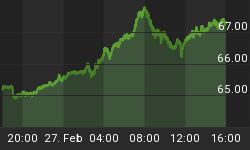Given that foreigners are the primary purchasers of US Treasury bonds (snapping up 56% of inventory in the last auction), a declining dollar is supposed to be a major drag on bond prices. But the market has shrugged of the recent dollar slump without so much as a hiccup. What gives? If foreigners are selling their dollars, why are they simultaneously buying dollar denominated bonds? From an investor's perspective, the only thing worse than owning current dollars is owning receipts for future dollars. If ever there was a true conundrum, the bond market is it.
One popular explanation on Wall Street is that bond investors are bidding up prices because they are confident that the Fed will keep inflation under control. In my view this requires taking a huge leap of faith that is out of character for historically cautious bond investors. With massive trade and budget deficits looming far into the future, trillions in unfunded liabilities coming home to roost, the bursting of the housing bubble, the retirement of millions of baby boomers, and insufficient domestic savings and productive capacity to fund any of it, I can't fathom how bond investors could be so sanguine.
Another theory is that the bond market is pricing in a recession and factoring in future Fed rate cuts. While this explanation may appear to have merit (a recession is likely), it too seems improbable. For one thing, U.S. long term rates are already extremely low even given the government's unrealistically rosy CPI numbers (factor in the imbalance between outstanding debt and domestic savings, and the current low level of interest rates makes even less sense). If the Fed cuts rates in response to a weakening economy, why should long-term rates, already lower than short-term rates, fall further? In fact they will likely do the reverse and rise sharply due to the inflationary effects of the rate cuts themselves, which will be particularly obvious in the foreign exchange market.
Another problem with the "bond market predicting recession" theory is that the stock market is predicting the opposite. If investors really do expect a recession, shouldn't it be reflected in both stocks and bonds? Markets do not exist in vacuums. There is nothing preventing bond investors from trading stocks, and vice versa. In most cases it's the same firms trading both. We have to expect that bond investors occasionally communicate with their peers on the other side of the office. Could it be that Wall Street now has a split personality?
The positive spin on today's jobs numbers typifies the confusion. By pointing to the 132,000 newly created jobs as evidence of economic strength, while simultaneously crowing about the soft .2% rise in average hourly earnings as proof of slowing inflation, Wall Street is eating and having cake. A closer look shows that while the service sector added 172,000 jobs, the goods producing sectors (construction and manufacturing) lost 44,000. This means that more workers will be collecting pay checks while fewer workers will be making things for them to buy. The result will be larger trade deficits, a weaker dollar, and therefore higher inflation and interest rates. This news is actually a big negative for both stocks and bonds.
So what is the really holding up the bond market? It could be foreign central bank buying, Fed monetization, hedging in the mortgage industry, speculative hedge fund strategies, a combination of all of these factors, or something else entirely. However, what ever the prop may be, one thing is certain: it will not be there forever. The longer it remains, the bigger the deluge will be when it finally gives way. That means the bond market is in fact a powder keg. The fuse is lit; we just do not know its length. But when it blows, look out. The carnage in the bond market and the implications for an economy addicted to low rates will be brutal.
Instead of trying to solve the mystery, bond investors would be well advised to sell now (not just their bonds but their dollars too) and ask questions later. If and when the answer is finally revealed it will likely be too late to do so.
Don't wait for reality to set in. Protect your wealth and preserve your purchasing power before it's too late. Discover the best way to buy gold at www.goldyoucanfold.com, download my free research report on the powerful case for investing in foreign equities available at www.researchreportone.com, and subscribe to my free, on-line investment newsletter at http://www.europac.net/newsletter/newsletter.asp.















